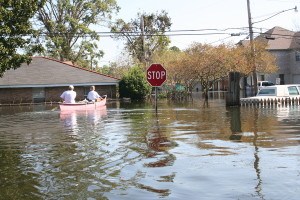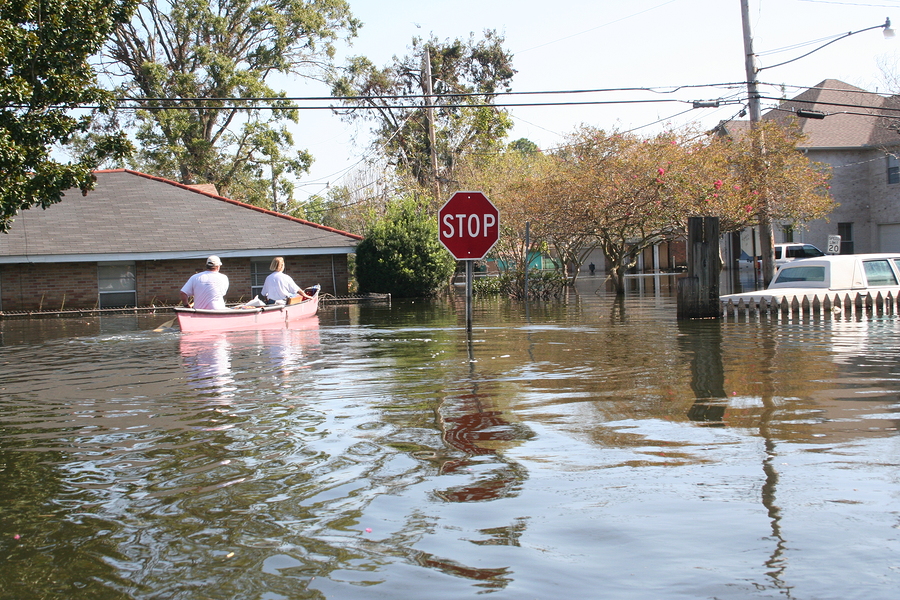The star witness will be absent when a long-awaited trial opens Monday for claims that thousands of homes flooded in the suburbs of New Orleans because parish officials evacuated its drainage pump operators on the eve of Hurricane Katrina’s landfall.
Former Jefferson Parish President Aaron Broussard is serving a prison sentence in North Carolina for his role in a bribery plot and isn’t expected to testify in person about the “Doomsday Plan” that the parish carried out before the August 2005 storm struck on his watch.
Instead, jurors will have to settle for viewing a videotape of a 2007 deposition where a plaintiffs’ lawyer grilled Broussard about his role in orchestrating the parish’s emergency preparations as Katrina barreled toward the Gulf Coast.
Plaintiffs’ attorney Darleen Jacobs said she and her colleagues didn’t see a need to have Broussard brought to Louisiana to testify in front of the jury. She wouldn’t speculate why parish lawyers don’t plan to call him as a witness.
“If they don’t want to produce their defendant, why do I care?” she said. “The deposition, I think, is good for me.”
Parish lawyer Dennis Phayer declined to be interviewed.
 Jury selection is scheduled to start Monday at a Gretna courthouse despite arguments by parish attorneys that they can’t get an impartial trial in Jefferson Parish due to the extent of Katrina’s flood damage here. They also cited negative publicity generated by Broussard’s unrelated criminal case as a reason for moving the trial out of Jefferson Parish.
Jury selection is scheduled to start Monday at a Gretna courthouse despite arguments by parish attorneys that they can’t get an impartial trial in Jefferson Parish due to the extent of Katrina’s flood damage here. They also cited negative publicity generated by Broussard’s unrelated criminal case as a reason for moving the trial out of Jefferson Parish.
Plaintiffs’ attorney Richard Martin scoffed at the parish’s assertion that a jury of its own residents can’t fairly evaluate the case and decide whether the parish and Broussard are liable for the catastrophic flood damage on both the east and west banks of the Mississippi River.
“It’s been 8 years,” he said. “This is not an issue at the top of everybody’s minds.”
But the anger lingers for many residents whose homes were wrecked by flood waters. Diane Fernandez, who lived with her husband in the gutted remnants of their Metairie home for two years after the storm, said she wants to see the parish and Broussard held accountable.
“We weren’t even given a chance,” she said. “They didn’t even try to save our homes.”
A retired judge from a different parish was appointed to preside over the case after all of the 24th Judicial District Court’s judges disqualified themselves. Judge John Peytavin certified the case as a class action and has refused to dismiss all of the plaintiffs’ claims before trial.
The broken levees that flooded most of New Orleans didn’t cause widespread damage in neighboring Jefferson Parish. The plaintiffs claim Jefferson Parish could have avoided massive flooding if the pumps hadn’t been left unmanned for more than 12 hours, allowing drainage canals to overflow.
Broussard argued that he was immune from liability for all disaster-related planning decisions and actions before, during and after the storm. In 2008, however, a state appeals court refused to dismiss plaintiffs’ claims that the order to evacuate more than 200 pump operators constituted “willful misconduct.” The appeals court also allowed the plaintiffs to proceed with claims that the parish failed to properly draft and implement its emergency plan.
During his November 2007 deposition, Broussard testified that he hadn’t heard of the Doomsday Plan before Katrina and didn’t make a unilateral decision to evacuate the pump operators along with other parish employees on Aug. 28, 2005. He said the plan was “implemented as designed.”
“Would you say the buck stops with you as parish president, generally, in decision making?” Jacobs, the plaintiffs’ attorney, asked Broussard.
“I think from an accountability standpoint in the public eye, that’s certainly a perception,” he responded.
Broussard added that he “relied on others to implement all plans.”
“Not knowing what those plans would be?” Jacobs asked.
“Not knowing exactly what those plans would be,” Broussard said.
Walter Maestri, who was Jefferson Parish’s emergency operations director when Katrina struck, testified that the Doomsday Plan was part of a larger emergency operations plan. Maestri, who wrote the original Doomsday Plan in 1998, called it a “living document” that was constantly being revised. Broussard, however, claimed he didn’t learn of its existence until after Katrina.
In a court filing last year, plaintiffs’ lawyers argued that Broussard’s “shockingly uninvolved behavior” during the parish’s emergency preparations constitutes “willful and wanton misconduct.”
“He callously ignored known dangers and the duties of his office with reckless disregard for the people and property in his parish,” they wrote.
Parish attorneys said there is no evidence of willful misconduct by officials.
“Plaintiffs have likened the pump operators to first responders such as police and firemen. But the Legislature in 2008 recognized that even such essential and critical personnel may be ordered to evacuate by the parish president,” they wrote in an August 2013 court filing. “Obviously, the Legislature did not consider the evacuation of essential personnel to be willful misconduct.”
Maestri testified that Broussard wanted the original Doomsday Plan to be modified, changing the destination for evacuating workers, because he “wanted no one to die on his watch.”
“No defectively drafted piece of paper flooded anyone’s home,” parish attorneys wrote. “The flooding was caused by a combination of factors, not one of which was the result of an alleged failure to review a plan years before or obtain an approval that no law required.”
Broussard, a Democrat whose political career spanned four decades, was re-elected to a second term as parish president despite the blame he shouldered for Katrina’s flood damage. He resigned in 2010 amid a corruption probe that also produced charges against his former wife and two other former parish officials.
A federal judge sentenced Broussard to nearly four years in prison after he pleaded guilty in September 2012 to charges he cheated taxpayers in a payroll fraud scheme and took payoffs from a parish contractor. In May 2013, he started serving his sentence at a low-security prison in Butner, N.C.
Was this article valuable?
Here are more articles you may enjoy.


 EVs Head for Junkyard as Mechanic Shortage Inflates Repair Costs
EVs Head for Junkyard as Mechanic Shortage Inflates Repair Costs  Travelers Survey: Distracted Drivers Making US Roads More Dangerous
Travelers Survey: Distracted Drivers Making US Roads More Dangerous  US Eyeing Ship’s Electrical System After Baltimore Bridge Crash
US Eyeing Ship’s Electrical System After Baltimore Bridge Crash  Poll: Consumers OK with AI in P/C Insurance, but Not So Much for Claims and Underwriting
Poll: Consumers OK with AI in P/C Insurance, but Not So Much for Claims and Underwriting 